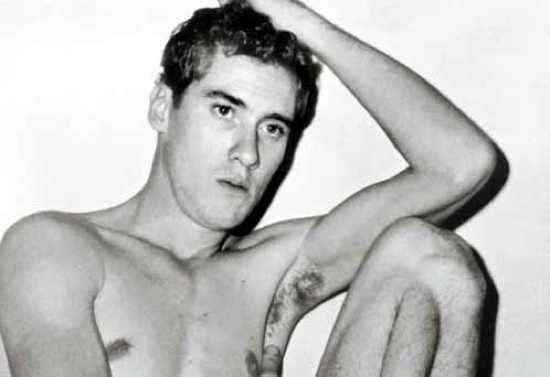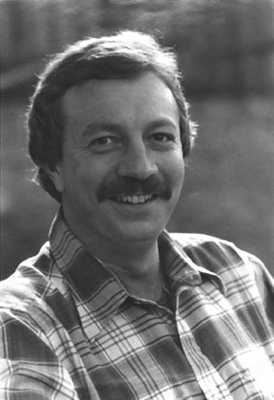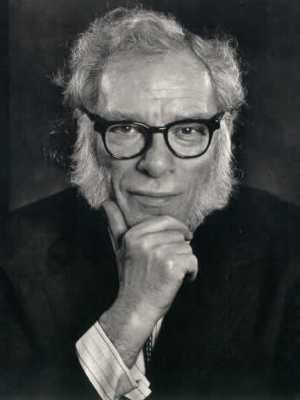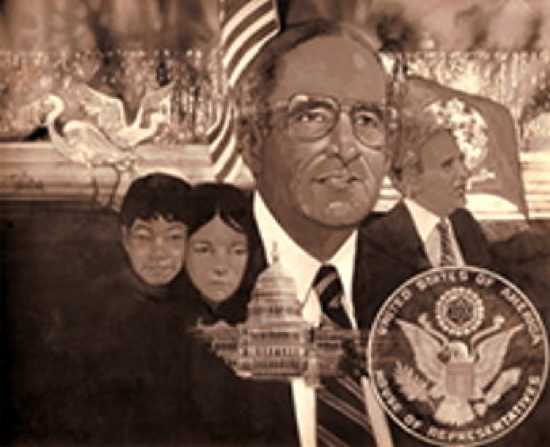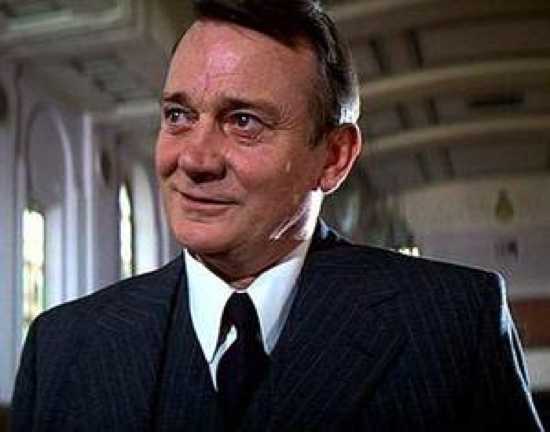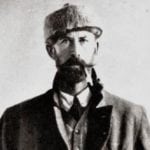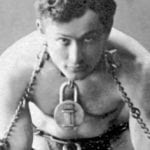Eric Lynn Wright, better known by his stage name Eazy-E, was an American rapper who performed solo and in the group N.W.A. In 1963, Wright was born in Compton, California. After dropping out of high school in the tenth grade, Eric supported himself primarily by selling drugs. In 1986, at the age of 23, Wright allegedly earned as much as USD $250,000 from dealing drugs. At this time in his life, Eric decided to move to Los Angeles and enter the hip-hop scene. In 1987, Eazy-E used his money to co-found Ruthless Records. Eazy-E’s debut album Eazy-Duz-It was released on September 16, 1988, and featured twelve tracks. To date it has sold over 2.5 million copies in the United States. After Ruthless Records artists Dr. Dre and Ice Cube wrote the song Boyz-n-the-Hood. Dr. Dre, Ice Cube, Eazy-E, DJ Yella, MC Ren and the Arabian Prince formed the group N.W.A. In 1988, N.W.A. released their most controversial album, Straight Outta Compton. The album has been viewed as a pioneering record in the genre of gangsta rap and has sold over three million copies. On February 24, 1995, Eazy-E was admitted to Cedars Sinai Medical Center in Los Angeles with what he believed to be asthma, but instead he was diagnosed with AIDS. Eric announced his illness to the public on March 16. One month after his diagnosis, on March 26, 1995, Eazy-E died from complications related to AIDS. He was only 31 years-old. Eric had seven children with six different women. “His distinctive delivery (described as a high-pitched whine), over-the-top lyrics, and undeniable charisma made Eazy-E a star.”
In 1944, John Holmes was born in Ashville, Ohio. As a teenager, John was discovered in a public bathroom by a photographer who noticed his large penis size. The man encouraged John to join the adult film industry. By 1978, Holmes was earning as much as $3,000 a day as a pornographic actor. He developed the personality of Johnny Wadd and became one of the most prolific male porn stars of all time. Holmes has appeared in over 2,500 adult loops, stag films and feature movies. In 1981, he claimed to have had intercourse with 14,000 separate women. In February 1986, Holmes was diagnosed as HIV positive. John Holmes died from AIDS-related complications on March 13, 1988, at the age of 43. After his death, John was awarded the Lifetime Achievement Award by the Adult film industry. Cinematographer Bob Vosse said “John Holmes was to the adult film industry what Elvis Presley was to rock ‘n’ roll. He simply was The King.” Since his death, Holmes has been the subject of several books, a lengthy essay in Rolling Stone magazine, two feature length documentaries, and was the inspiration for two Hollywood movies, Boogie Nights and Wonderland.
In 1938, Emerson Moore was born in the Harlem section of New York City. He converted to Catholicism at the age of 15. On May 30, 1964, Moore was ordained a priest by Cardinal Francis Spellman at St. Patrick’s Cathedral. In 1979, he welcomed Pope John Paul II to Harlem, where the Pope gave an address to African Americans at St. Charles Borromeo. Shortly after the Pope’s appearance, Moore was elevated to the rank of monsignor, becoming the first African American to receive that honor. On July 3, 1982, Moore was appointed auxiliary bishop of New York by John Paul II. He was the sixth African American to serve as a Catholic bishop in the United States, and the first to serve in the state of New York. Emerson Moore was diagnosed with HIV in the late 1980s. It is not clear how he contracted the disease. In 1994, Moore entered a drug and alcohol treatment center in Center City, Minnesota. On September 14, 1995, Emerson Moore died due to complications with AIDS. He was 57-years-old. The Archdiocese of New York made an official announcement following his death saying Moore had died of “natural causes of unknown origin.” At his funeral Cardinal O’Connor spoke of the hardships that Moore faced as an African-American bishop in the Catholic Church.
Ösel Tendzin was born Thomas Rich, on June 28, 1943, in Passaic, New Jersey. He first met Chögyam Trungpa in February 1971, in Boulder, Colorado. Trungpa was a Buddhist meditation master and one of the first Tibetan Buddhist lamas to visit the West. He is recognized as a preeminent teacher of Tibetan Buddhism. Trungpa was a major and controversial figure in the spread of Tibetan Buddhism to North America. According to Ösel Tendzin, Trungpa revealed his intention to make him a successor not long after their initial meeting. Starting in 1973, Tendzin began to hold duties in the management of Vajradhatu, which is an umbrella organization that Trungpa developed. It serves as the vehicle for the spread of Buddhist teachings. In April 1976, it was announced for the first time that Ösel Tendzin would replace Chögyam Trungpa after his death. It was a controversial decision to appoint a U.S. citizen to this role. Tendzin assumed leadership of the organization in 1987, with the death of Trungpa. Ösel Tendzin’s leadership was marked by controversy in the Vajradhatu. He denied students permission to seek advice from other Kagyu Tibetan teachers, and claimed that only he possessed the knowledge unique to the Trungpa lineage. One scholar has noted, Tendzin was bisexual and known to be very promiscuous and enjoyed seducing straight men. Not all his partners were unwilling and “it became a mark of prestige for a man, gay or straight, to have sex with Ösel.” It was revealed in 1989 that Ösel Tendzin had contracted HIV. Yet he continued to have unprotected sex with his students without informing them. Tendzin transmitted HIV to at least one man who later died of AIDS. The board of directors of Vajradhatu knew for two years that Tendzin was HIV positive and sexually active, but kept the information silent. Ösel Tendzin died from AIDS-related complications in 1990. His rule as the holder of the Kagyu and Nyingma lineages was marked by bad decisions and a decline in the goals set forth by Chögyam Trungpa.
In 1951, Ondrej Nepela was born in Bratislava, Slovakia. He began skating at the age of 7 and was coached by Hilda Múdra. Nepela’s first major international competition, at the age 13, was the 1964 Winter Olympics, where he finished 22nd. As Nepela grew stronger, he went on to win the European Figure Skating Championships five times between the years of 1969-1973. He captured the World Figure Skating Championships in 1971, 1972, and 1973, and the 1972 Olympic gold. Ondrej Nepela retired after the 1973 season. Some felt he left skating early, as Nepela was only 22-years-old when he quit active competition. Following his amateur skating career, Nepela toured for 13 years as a soloist with Holiday on Ice. He then established himself as a coach in Germany. Ondrej Nepela died of AIDS-related complications on February 2, 1989, at the age of 38. It is unclear how he acquired HIV, but Nepela was a homosexual man. In his second autobiography, Toller Cranston, who was a Canadian figure skater, detailed a sexual tryst between himself and Nepela at the 1973 World Championships. Cranston said he was distracted during the competition by the affair and placed 5th, while Nepela won the event. In December 2000, the Slovak Republic named Ondrej Nepela the Slovakian athlete of the century.
Isaac Asimov was born between October 4, 1919, and January 2, 1920 in Petrovichi, Soviet Russia (near the modern border with Belarus). When he was 3-years-old, Asimov’s family immigrated to the United States. As he grew older, Asimov was interested in science-fiction and creative writing. He became one of the most prolific science-fiction writers of all time, having published or edited more than 500 books and over 9,000 letters. Isaac Asimov is widely considered a master of hard science-fiction and, along with Robert A. Heinlein and Arthur C. Clarke, was considered one of the “Big Three” science-fiction writers during his lifetime. Asimov’s most famous work is the Foundation series. He also published the Galactic Empire series and the Robot series. Asimov wrote many short stories, including Nightfall (1941), which in 1964 was voted by the Science Fiction Writers of America as the best short science fiction story of all time. He is credited with coining the term “robotics.” Asimov was also a prolific mystery author and a frequent contributor to magazines. In 1977, he suffered a heart attack and had triple bypass surgery in December 1983. When he died in New York City on April 6, 1992, at the age of 72, Asimov’s brother Stanley reported the cause of death as heart and kidney failure. Ten years after his death, Janet Asimov’s edition of his autobiography, It’s Been a Good Life, revealed that the myocardial and renal complications her husband suffered from were the result of an infection by HIV, which Isaac had contracted from a blood transfusion received during his bypass operation. Janet wrote in the epilogue that Isaac had wanted to go public about his illness, but his doctors convinced him to remain silent, warning that the anti-AIDS prejudice would likely extend to his family members. This is a recurring theme with people diagnosed with AIDS. They decide to stay silent to protect their loved ones.
In 1960, Gia Carangi was born in Philadelphia, Pennsylvania. While in high school, Carangi bonded with “the Bowie kids,” a group of obsessed David Bowie fans. She emulated Bowie’s high-glam style. Gia was drawn to Bowie not only due to his fashion preferences, but also his gender play and outspoken bisexuality. A friend of Carangi said “she was beginning to settle into a lesbian identity, but did not want to take up the accepted lesbian style.” After Gia was featured in a collection of Philadelphia newspaper ads, she moved to New York City at the age of 17 and quickly rose to prominence in the world of modeling. By the end of 1978, Gia was a well-established model. She was featured on the cover of many different fashion magazines. In October 1978, Carangi did her first major shoot with fashion photographer Chris von Wangenheim. Wangenheim had her pose nude behind a chain-link fence. While in New York City, Carangi became a regular at Studio 54 and the Mudd Club. She used cocaine in clubs, but later developed a heroin addiction. By 1980, Carangi began to display a violent temper. She walked out of photo shoots and even fell asleep in front of the camera. In fall 1981, at the age of 21, Carangi looked significantly different. Her last cover shoot was taken in the winter of 1982 for Cosmopolitan magazine. In the early 1980s, Carangi was diagnosed with AIDS, which was a newly recognized disease. It is believed that she received the virus by sharing an infected needle. On November 18, 1986, aged 26, Gia Carangi died of AIDS-related complications. Her death was not widely publicized and few people in the fashion industry attended her funeral. Gia Carangi is thought to be one of the first famous women to die of AIDS.
In 1950, Dan Hartman was born in Pennsylvania’s capital, Harrisburg. He joined his first band, The Legends, at the age of 13. After leaving the group, Hartman spent a period of time backing the Johnny Winter Band and then joined the Edgar Winter Group where he played bass on three of their albums. He wrote the band’s second biggest pop hit Free Ride in 1972. Dan Hartman began his solo career in 1976. In late 1978, he reached #1 on the Dance Charts with the disco single Instant Replay, which crossed over to #29 on the Billboard Hot 100. In 1984, Hartman reached the Top 10 again with the single I Can Dream About You. During the next decade he worked as a songwriter and producer, and collaborated with such artists as Tina Turner, Dusty Springfield, Joe Cocker, Bonnie Tyler, Paul Young, James Brown, the Plasmatics and Steve Winwood. Hartman produced and co-wrote the song Living in America, a #4 hit for James Brown which appeared on the soundtrack of 1985’s Rocky IV. The song was the last of Brown’s 44 hit recordings to appear on the Billboard Top 40 charts. At the end of the 1980s, Dan Hartman was diagnosed with HIV. He did not discuss his sexual orientation, but was openly gay. Three and a half months after his 43rd birthday, on March 22, 1994, Dan Hartman died at his Westport, Connecticut, home, of an AIDS-related brain tumor. At the time of his death, his music was enjoying a revival. A cover version of Relight My Fire became a British number-one hit for Take That and Lulu. Sales of Hartman’s solo recordings, group efforts, songwriting, and compilations exceed 50 million records worldwide.
In 1931, Stewart McKinney was born in Pittsburgh, Pennsylvania. At the age of 35, McKinney was elected to the Connecticut State House of Representatives as a Republican. In 1970, he ran for the U.S. House and won. McKinney served in the House as a moderate Republican until his death. He is remembered for the Homeless Assistance Act of 1986, which provided U.S. federal money for shelter programs. McKinney is credited with coining the phrase “too big to fail” in connection with large banks. In 1979, Stewart became ill and had heart surgery. A few years later he was diagnosed with HIV. His health concerns were not made public until shortly before his death. On May 7, 1987, Stewart McKinney died from AIDS-related disease. His physician claimed that McKinney became infected with HIV from a blood transfusion during his heart surgery. It remains unclear exactly how Stewart McKinney contracted HIV. He was actively bisexual and it is possible that McKinney got AIDS from unsafe sex. McKinney was married to Lucie Cunningham, who is the granddaughter of a co-founder of Standard Oil. They had five children together. Stewart McKinney was the first U.S. congressman to die from AIDS. After his death, U.S. Congress renamed the Salt Meadow National Wildlife Refuge in Connecticut to the Stewart B. McKinney National Wildlife Refuge. His son John McKinney is now the State Senator from Fairfield, and is minority leader of the Connecticut State Senate. He is rumored to be a future congressional candidate from the Fourth District.
In 1922, Denholm Elliott was born in London, England. During World War II, Elliott joined the Royal Air Force and trained as a sergeant radio operator and gunner. He served with the No. 76 Squadron RAF. In late September 1942, Elliott’s bomber took part in an air raid on the U-boat pens at Flensburg, Germany. The aircraft was hit by flak and subsequently ditched in the North Sea near Sylt, Germany. Elliott and two other crew members survived the crash and spent the rest of the war in a prisoner of war camp in Silesia. After making his film debut in Dear Mr. Prohack (1949), Denholm Elliott went on to play a wide range of roles. He is one of the most prominent character actors of the 20th century. Elliott has over 120 film and television credits to his name. In the 1980s, he won three consecutive British Academy of Film and Television Arts (BAFTA) awards for Best Supporting Actor in Trading Places as Dan Aykroyd’s kindly butler, A Private Function, and Defence of the Realm, as well as an Academy Award nomination for A Room with a View. Elliott is most recognized as Dr. Marcus Brody in Raiders of the Lost Ark (1981) and Indiana Jones and the Last Crusade (1989). The list of famous actors that Denholm Elliott has worked with is extensive. In 1988, he was appointed a Commander of the Order of the British Empire (CBE) for his service to acting. His career has included many stage performances with the Royal Shakespeare Company. Elliott was privately bisexual and married twice, the first to the British actress Virginia McKenna for a few months in 1954 and later, in an open marriage, to actress Susan Robinson, with whom he had two children. Denholm was diagnosed with HIV in 1987 and died of AIDS-related tuberculosis at his home on Ibiza, Spain, on October 6, 1992. He was 70 years-old.
A recurring concept in the life of famous people who die from AIDS is secrecy. This brings up the question. Who is out there that died from HIV, but the information was never made public? In the last 15 years, there are practically no influential personalities to die from AIDS-related complications. With the amount of people who die from the disease every year, statistics say that notable deaths are unaccounted for. Rumors exist and we will examine the big ones. The first is regarding Palestinian leader Yasser Arafat. In late 2004, after effectively being confined for over two years by the Israeli army, Arafat became ill, fell into a coma and died at the age of 75. After his death, John Loftus reported on ABC radio that Arafat had died of AIDS. According to Loftus, the CIA had knowledge of his condition, and convinced Israel not to assassinate him and wait for his inevitable death of the disease, since the subsequent widespread connotations of the disease with homosexuality would discredit him. Others feel Arafat was poisoned with polonium. The next rumor is surrounding the death of American business magnate Howard Hughes. In a 1993 publication, Howard Hughes: The Secret Life, written by Charles Higham, it is claimed that Hughes may have been one of the first people to die from AIDS, in 1976. This is suggested because his symptoms were characteristic of an AIDS-related illness. Rumors have been swirling around the death of Jim Henson, who was the creator of The Muppets. He died in 1990 from a sudden case of organ failure resulting from Streptococcus pyogenes, a severe Group A streptococcal infection. More recently Internet rumors have been spreading over the death of comedian Bernie Mac. Mac suffered from sarcoidosis, which is an inflammatory lung disease that produces tiny lumps of cells in the solid organs, but the condition was in remission. His death on August 9, 2008, was caused by complications from pneumonia. I am going to run through a list of famous people who have been known to die from something besides AIDS, but rumors persist. They are James Brown, Patrick Swayze, Luther Vandross, Bob Marley, Andy Warhol, and football great Lyle Alzado. American actress Brittany Murphy’s sudden death in 2009 is strange. Her doctors have said that “it appears to be natural.” Her death certificate lists the cause of death as “deferred.” On February 4, 2010, the Los Angeles County coroner stated that the primary cause of Murphy’s death was pneumonia, with secondary factors of iron-deficiency anemia. The shocker came six months after her death when The L.A. County Coroner announced that the husband of Brittany Murphy, Simon Monjack, had died from the same acute pneumonia and severe anemia. In the final years of his life Michael Jackson’s body type experienced some severe changes. He became extremely skinny and frail. Jackson regularly used a wheelchair and many people questioned whether he could perform his 2009 concert tour obligations. Before his death, a collection of articles were published that questioned whether Jackson had cancer or AIDS. To the general public, it appeared that Michael’s 50 year-old frame was wearing down faster than expected. As conspiracy theories flow, people have latched on to the fact that Michael Jackson and his good friend Elizabeth Taylor were avid AIDS activists.

